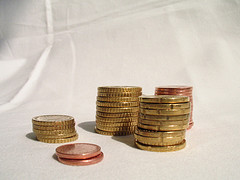‘Some 60% of women cannot earn their own keep’

You’d think a mobile euthanasia unit or a pedophile political party would be taboo in the Netherlands, but one of the biggest taboos I know of is about Dutch women not being able to earn enough money to pay their way through life. The irony is, according to a recent report by Delta Lloyd Group Foundation, 70% do believe it is important to be able to take care of themselves, but in actual fact, they don’t or don’t want to. (Some 75% of Dutch women work part-time and 40% of the population still believes that women with children should not work full-time.)
I’ve heard all kinds of arguments and personal stories from Dutch men and women in all kinds of situations (kids, no kids, divorce) that have made me understand why some women ‘cannot’ work (they lose money!) still today in 2012, and the government can be blamed for a lot of it: a too high standard of living as compared to other EU countries relies on the ‘informal’ network (moms, grandparents babysitting, neighbours caring for elderly), much like big companies used to abuse the environment and let governments pay to clean it up.
But not ‘wanting’ to work or work more in a recession — we are officially in one today — is making someone else (husband, partner, society) pay for you, when you should be helping yourself out, if not your family. It makes men and women continue to think that more than half of Dutch women are not equal to men. The entire Western world works, has families, raises children and runs businesses, so what’s the hold up?
(Link: www.telegraaf.nl)

Work work..we are tired!
I can understand why women find it necessary to be (or at least feel) financially independent, but to my mind, it isn’t the most important issue confronting women, in the Netherlands or abroad. As a Dutch national currently living in California, I enjoy a certain respect as a stay-at-home (and therefore financially dependent) mother. It is considered a respectable, reasonable, and sometimes even enviable choice to ‘sacrifice’ that second income in favor of one’s children. We live in a very high cost-of-living area (Silicon Valley), without government-subsidized healthcare, childcare or ‘kinderbijslag’, but are living very comfortably on a single income.
I think a one-income family deserves more respect and more serious consideration as an alternative for the 2 days daycare, day with grandparents, mommy-day, daddy-day model many young Dutch families struggle with. It’s not for everyone, but I do find that our life is much more stable and less stressful with this construction.
So, my suggestion to the women in the study: consider if financial independence is really something you find that important. Based on the findings, I think not. It would just be nice if we would be allowed to admit it, and not be judged as anti-feminist.
Being financially independent is not an issue until a break up occurs. Why should society pay for people’s bad life choices? No one will pay for my business if I go bankrupt.
Money is not the most important thing in life.
Putting more emphasis on a healthy family life and education of your children is more important than buying things you really don’t need.
Ah yes, but when a break up occurs, women are left with almost nothing because they had no back up plan. That’s bad for kids.
[…] the United Arab Emirates—and the Arabs at least are working to improve theirs. Furthermore, 60% of all Dutch women do not make enough money to pay their way through life—but they like it that way! In fact, men want some of that […]
[…] Just remember that the Netherlands ranks in bottom 10 performing countries for women in business and Some 60% of women cannot earn their own keep. […]